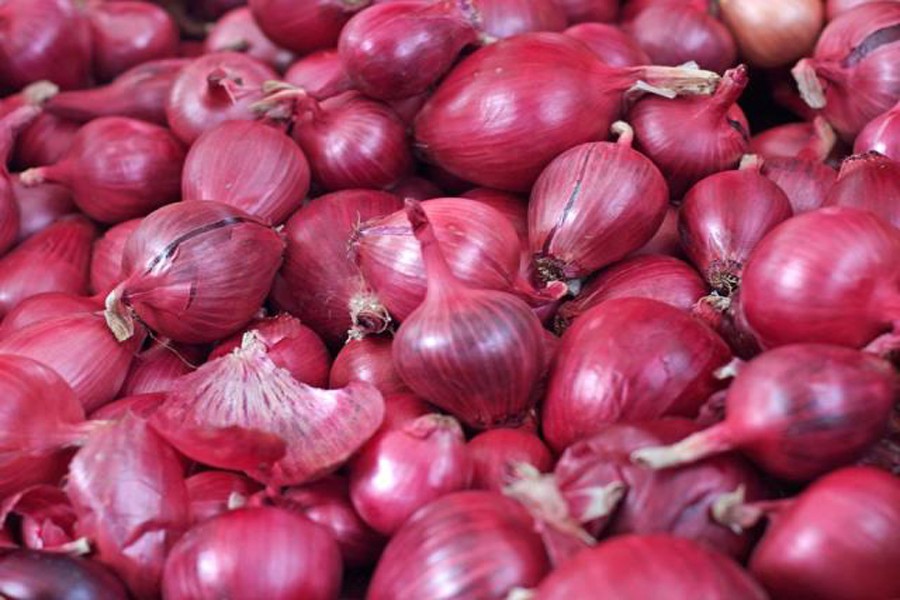Fruits, fish, vegetables and most other eatables have lost their smells and flavours, either partially or altogether. The local variety of onion, more of a spice than vegetable, has retained most of its properties. When sliced or crushed, onions release chemical irritant known syn-propanethial-S-oxide, stimulating lachrymal glands. This is the reason behind making the eyes tear. But the onion's capacity to cause the eyes to burn in today's Bangladesh is a poor match for its power to burn the fingers of consumers. The price of the essential kitchen item is sky-high at Tk 120 a kilogram -of course a record now.
To say that the onion market is volatile is a mere understatement. Prices of this spice-cum-vegetable has galloped erratically for sometime before dealing the final blow weeks before the new harvest arrives in the market. Last year the country reportedly had a shortfall of only 0.4 million tonnes with a record total production of 1.86 million against a demand for 2.2-2.4 million tonnes. But 1.04 million tonnes were imported.
Clearly, the country should have a substantial amount of surplus of this essential farm produce. How does the price of onion then soar without restraint? Accusing fingers have rightly been pointed at market manipulation by onion traders. The pattern of effecting price rise by them says it all. First, they used the excuse of floods in the country's northern districts for raising the price of onions. From Tk 25 a kilogram, it became Tk 40-45 a kilogram in no time. The price then jumped to Tk 55-60. In the last but one gasp, the price hovered in between Tk 80-90. There was however a slight fall in price, though, for a while. The timing of floods has nothing to do with harvesting of onion. Harvesting begins tentatively in late December and continues for about two months.
Every year, traders take recourse to the ploy of a late burst of price hike of this kitchen item throughout a period ranging between October and December. This year, their plan was expanded further to fleece consumers on this or that pretext. True, traders here learn some of their tricks from their Indian counterparts.
If the government there restricts export of onion or any other commodity, so much the better for local traders here. In India also the onion market has heated up and the government there imposed a ban on export of the item. Traders in Bangladesh have taken full advantage of the situation.
This is no free-market economy. When there is no real crisis of any item but traders manipulate the market to create an artificial crisis, it is a business crime. The authorities have every right to fight this type of crime and bring those responsible to book. Unfortunately, the government is found napping when the market is on fire.
Settling the account is simple. Local production plus the imported quantity come together to 2.8 million tonnes as against a demand for 2.2-2.4 million tonnes. If monitored closely by the authorities concerned, traders could not make the outrageously windfall profit.
What was the procurement price from farmers during the harvest? Certainly not more than Tk 15-20 a kilogram. The price of the imported variety had to be even lower because of the inferior quality. This establishes the fact that the business syndicates targeted onion for making irrational profit.
They have been successful in their dubious venture as they often are in case of other commodities. Rice was another such item. Devoid of business ethics and love for the country and its people, here is a section which can go to any length in order to make outrageous profits on items they find to their liking.


